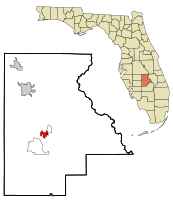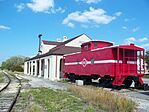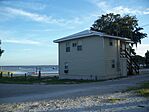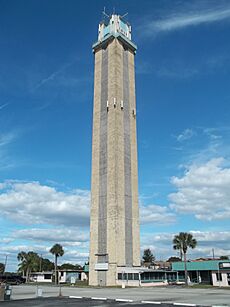Lake Placid, Florida facts for kids
Quick facts for kids
Lake Placid, Florida
|
||
|---|---|---|
| Town of Lake Placid | ||
|
left: Old Lake Placid Atlantic Coast Line Railroad Depot; right: Lake Placid Conference Center
|
||
|
||
| Nickname(s):
"Caladium Capital of the World"
"Town of Murals" |
||

Location in Highlands County and the state of Florida
|
||
| Country | ||
| State | ||
| County | Highlands | |
| Settled | 1912 | |
| Incorporated (Town of Lake Stearns) |
December 1, 1925 | |
| Incorporated (Town of Lake Placid) |
June 6, 1927 | |
| Government | ||
| • Type | Mayor-Council | |
| Area | ||
| • Total | 4.71 sq mi (12.21 km2) | |
| • Land | 4.66 sq mi (12.07 km2) | |
| • Water | 0.05 sq mi (0.13 km2) 1.4% | |
| Highest elevation | 173 ft (53 m) | |
| Lowest elevation | 72 ft (22 m) | |
| Population
(2020)
|
||
| • Total | 2,360 | |
| • Density | 506.22/sq mi (195.47/km2) | |
| Time zone | UTC-5 (Eastern (EST)) | |
| • Summer (DST) | UTC-4 (EDT) | |
| ZIP Codes |
33852, 33862
|
|
| Area code(s) | 863 | |
| FIPS code | 12-38625 | |
| GNIS feature ID | 285272 | |
Lake Placid is a town located in Highlands County, Florida, in the United States. It is part of the Sebring area. In 2020, about 2,360 people lived there.
The town has two fun nicknames. It's called the "Town of Murals" because of the many colorful paintings on its buildings. It's also known as the "Caladium Capital of the World." This is because 98% of the world's caladium plant bulbs come from Lake Placid. Farmers have grown these plants there since the 1940s. In 2013, Reader's Digest magazine even called Lake Placid "America's Most Interesting Town."
The town is also home to the Lake Placid Tower. This tall observation tower is about 240 feet (73 meters) high.
Contents
History of Lake Placid
Lake Placid was first known as "Lake Stearns." It officially became a town on December 1, 1925. Dr. Melvil Dewey, who invented the Dewey Decimal System for libraries, suggested a new name. He founded the Lake Placid Club in Lake Placid, New York.
On April 29, 1927, the town leaders agreed to Dr. Dewey's idea. They asked the Florida State Legislature to change the name. On June 6, 1927, the community was officially named the Town of Lake Placid.
Geography and Climate
Lake Placid is in the middle of Highlands County. U.S. Route 27 runs through the town. This road goes north about 16 miles (26 km) to Sebring, which is the county seat. It goes south about 58 miles (93 km) to Clewiston.
The town covers about 3.65 square miles (9.45 square kilometers). Most of this area is land. The climate here has hot, humid summers and mild winters. This type of weather is called a humid subtropical climate.
Population Facts
| Historical population | |||
|---|---|---|---|
| Census | Pop. | %± | |
| 1930 | 582 | — | |
| 1940 | 340 | −41.6% | |
| 1950 | 417 | 22.6% | |
| 1960 | 1,007 | 141.5% | |
| 1970 | 656 | −34.9% | |
| 1980 | 963 | 46.8% | |
| 1990 | 1,158 | 20.2% | |
| 2000 | 1,668 | 44.0% | |
| 2010 | 2,223 | 33.3% | |
| 2020 | 2,360 | 6.2% | |
| U.S. Decennial Census | |||
The population of Lake Placid has changed over the years. In 1930, there were 582 people. By 2020, the population grew to 2,360.
People in Lake Placid (2020 Census)
In 2020, there were 2,360 people living in Lake Placid. There were 764 households and 494 families.
The town's population includes people from different backgrounds. About 47% of the people were White (not Hispanic). About 7% were Black or African American (not Hispanic). About 1% were Asian (not Hispanic). People of Hispanic or Latino background made up about 42% of the population.
Media and News
Television
Lake Placid can receive TV signals from nearby cities. These include channels from Orlando, Fort Myers, Naples, and the Tampa Bay area. There are no TV stations located directly in Lake Placid.
Radio
Lake Placid is part of the Sebring radio market. The local radio station WWTK 730 kHz covers the area. However, no radio stations have their main studios or broadcast towers in Lake Placid itself.
Newspapers
The Highlands News-Sun is a daily newspaper from Sebring that circulates in Lake Placid. The Journal, a local weekly paper, used to be published in Lake Placid for almost 60 years but is no longer printed.
Fun Places to Visit
Lake Placid Tower
The Lake Placid Tower is a tall observation tower. It was built in 1960 and opened on January 1, 1961. When it first opened, it was the tallest concrete block building in the world!
The tower is about 240 feet (73 meters) tall. It has three levels where people could look out. For many years, tourists could ride an elevator to the top to see amazing views. The ride took only 65 seconds. The tower closed to tourists in 2003. Today, it is used as a cell phone tower.
Historical Society Depot Museum

The Old Lake Placid Atlantic Coast Line Railroad Depot is a historic train station. It is now home to the Historical Society Depot Museum. You can find it at 12 East Park Street. This old building is so important that it is listed on the National Register of Historic Places.
Wall Murals
Lake Placid is famous for its 51 large murals painted on the sides of buildings. These murals are a big draw for tourists. You can buy a booklet at the Welcome Center that shows a map of the murals. It also tells you about the history shown in each painting and who the artists were.
The idea for the murals started in 1992 with Harriet and Bob Porter. Different artists have painted them over the years. Many of the murals show the history of the Lake Placid area. Some even use a special painting trick called trompe-l'œil, which makes flat paintings look like real 3D objects.
Toby's American Clown Museum and School
Lake Placid is also home to the American Clown Museum and School. It was started in 1993. Here, you can see more than 700 interesting items related to clowns.
Sister Cities
Lake Placid has "sister city" relationships with two other towns:
- Lake Placid, New York, United States of America
- Lompoc, California, United States of America
See also
 In Spanish: Lake Placid (Florida) para niños
In Spanish: Lake Placid (Florida) para niños





